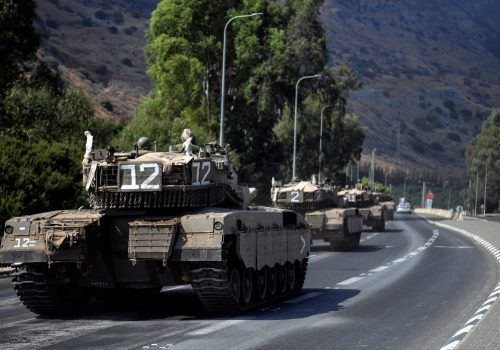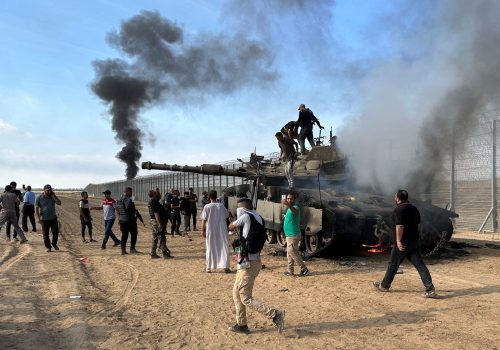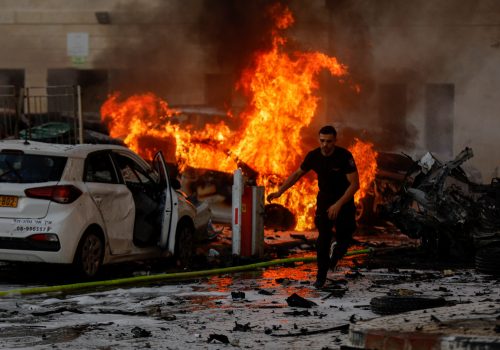Hamas’s attack underscores the need for US and Israeli policy to change course
The significant attack on Israel launched by Hamas on Saturday—dubbed “Al-Aqsa Storm” by the Palestinian militant group—is an indictment of the policies pursued by both the governments of Israel and the United States. Unrest caused by the domestic debate over judicial reform in Israel may have compromised the country’s deterrence. And US policies aimed at de-escalating tensions with Iran did nothing to halt Tehran’s coordination with Hamas, likely including support for its attack against Israel.
The drivers of the attack and the failure to deter it are manifold. The Islamic Republic of Iran’s proxy and partner network—comprised of Hamas, Hezbollah, and Palestinian Islamic Jihad (PIJ)—perhaps perceived Israel as weakening from within. Unrest over Israeli judicial reforms this summer—during which reservists threatened to refuse to serve—likely reinforced Tehran’s impression that the Jewish state is collapsing. This may have in part prompted all these groups to push the envelope in recent months—in Lebanon, the West Bank, and Gaza—to realize the Iranian supreme leader’s ambition to surround Israel in a “ring of fire.”
Coordination among Iran and its allies
There was significant coordination among Iran, Hezbollah, and Hamas, and PIJ throughout September 2023. Hezbollah’s Secretary-General Hassan Nasrallah hosted Saleh al-Arouri, the deputy head of the Hamas politburo, and Ziyad al-Nakhalah, the secretary-general of Palestinian Islamic Jihad, on September 2. This meeting coincided with a visit from Iran’s Foreign Minister Hossein Amir-Abdollahian to Lebanon. The commander of the Islamic Revolutionary Guard Corps’ (IRGC) Quds Force, Esmail Ghaani, also reportedly visited Lebanon in September. Late last month, al-Arouri, Nikhalah, and the Popular Front for the Liberation of Palestine’s Deputy Secretary General Jamil Mazhar also met, announcing their intention to escalate conflict with Israel. They issued a statement dubbing Israeli settlers’ demands a “declaration of war against the Palestinian people.” They also criticized the normalization process that has been underway between Israel and Saudi Arabia, calling it “a clear betrayal of the blood of the martyrs and the Arab people.”
This dialogue continued in Tehran, which hosted representatives of its Axis of Resistance factions during an International Islamic Unity Conference held October 1–3. Osama Hamdan, Hamas’s representative in Lebanon and a member of its politburo, was in Iran for the conference, as was Naim Qassem, Hezbollah’s deputy secretary general. The Islamic Republic’s Supreme Leader Ayatollah Ali Khamenei spoke at the conference, prophesying that Israel is dying; that the Palestinian cause “is the main issue of the Islamic world”; and warning those countries considering establishing diplomatic relations with the Jewish state that “they are betting on a losing horse.”
Iran has been seeking to create a mutual defense pact among its proxies and partners. On Sunday, Hezbollah already shelled and rocketed Israeli positions in a show of support for Hamas and a nod to the IRGC’s ambition to establish a NATO-like formation among the Axis of Resistance. Whether this expands into a more significant northern front as Israel prepares to crush Hamas in Gaza in the coming days and weeks will be important to watch and a test of the IRGC’s eagerness to escalate. Hamas has also been moving closer to the orbit of Iran and Hezbollah. In September, Iran International TV, a Persian-language news channel headquartered in London, exposed a network led by Saeed Izadi, the head of the IRGC’s Quds Force’s Palestinian Division, which smuggled arms from Iran to Lebanon for Hamas.
Failures of deterrence
US policy has also played a role in the current escalation. The Biden administration has been engaged in implementing a series of understandings with Tehran to keep the Iran file off the president’s desk ahead of his campaign for reelection. The publicly reported components of these informal agreements include Iran refraining from targeting US forces in Iraq and Syria, as well as steps for Tehran to slow down its accumulation of 60 percent enriched uranium and refrain from advancing its nuclear program above that level. This is apparently in exchange for Washington turning a blind eye to Iran’s illicit exports of oil to customers such as China in contravention of US sanctions.
US officials, such as National Security Advisor Jake Sullivan, have been championing this record, saying on September 29 that the White House hoped to “depressurize, deescalate, and ultimately integrate the region.” He went on to state that “the Middle East region is quieter today than it has been in two decades now.” Given this weekend’s attack on Israel, such assessments appear fanciful. Tehran and its partners are demonstrating they can simultaneously escalate in theaters which are not covered by its informal understandings with the United States even as it deescalates in others. These are adjustments in tactics, not changes in fundamental strategy by the IRGC and its militia network. Washington’s refusal to more strictly enforce sanctions against Iran misses an opportunity to further curtail Iran’s funding for its regional allies such as Hamas.
Since Hamas attacked Israel on Saturday, US Secretary of State Antony Blinken has said the administration has “not yet seen evidence that Iran directed or was behind this particular attack.” But Iranian involvement is not binary. Tehran, through its patronage of Hamas, has created the conditions for this moment and at the very least likely had foreknowledge of and endorsed the attack. In fact, Hamas spokesman Ghazi Hamad told the BBC that the group had direct backing from the Islamic Republic. The US government should not shy away from holding both the attacker and its patron responsible. It will be the only way to alter the calculus in Tehran to make the costs of such support outweigh the benefits. Piecemeal sanctions alone will not do the job.
The intelligence failures leading to what many Israelis are calling their 9/11 will be examined in the weeks ahead. Local grievances in Israel and the Palestinian territories have certainly brought about the current moment and should not be understated. But both Israel and the United States should also engage in deep introspection at the policy level over their failure to deter Hamas’s brutal attack.
Jason M. Brodsky is the policy director of United Against Nuclear Iran (UANI). He is also a non-resident scholar at the Middle East Institute’s Iran Program. His research specialties include Iranian leadership dynamics; the Islamic Republic’s security and military apparatus; and Israel’s relations with Iran. He is on X @JasonMBrodsky.
Further reading
Sun, Oct 8, 2023
Dispatch from Jerusalem: How does this end?
New Atlanticist By William F. Wechsler
Israel must not make the same mistakes that the United States made after 9/11. Here are some critical questions to ask now.
Sat, Oct 7, 2023
Is the Hamas assault on Israel the beginning of a wider war?
Fast Thinking By
On Saturday, Hamas militants infiltrated Israel in a brazen, sophisticated attack that killed more than one hundred and injured hundreds more.
Sat, Oct 7, 2023
Experts react: Israel is ‘at war’ after Hamas militants launch major assault
New Atlanticist By
The Palestinian militant group Hamas launched its boldest assault on Israel in decades. Atlantic Council experts offer their thoughts on the events.
Image: A militant looks on during the funeral of two Palestinians, including a fighter of the Islamist Hamas group, who were killed in an Israeli raid, in Tulkarm in the Israeli-occupied West Bank September 24, 2023. REUTERS/Raneen Sawafta


